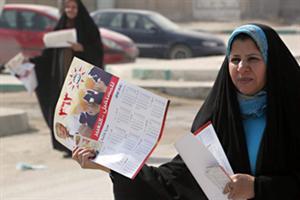Watch Out Powers That Be: Women Dissidents Rock And Roar
 Female dissidents are rewriting the rules in countries where they can't even show their faces.
Female dissidents are rewriting the rules in countries where they can't even show their faces.For women in Iraq, running for office is an especially risky proposition. The country's Constitution, like those of many nations that have been racked by conflict, requires that a quarter of all parliamentary seats must go to women.
Yet even as the number of female leaders and political activists has increased, so has the backlash. In February, a female candidate was shot and killed in Mosul.
Yet female activists continue to challenge Iraq's religious conservatives. Hanaa Edwar, one of the founders of the Iraqi Women's Network, a coalition of NGOs, recently blasted the minister of education for trying to separate boys and girls in public schools.
"These ideas are imported from Iran!" she says.
The minister eventually backed down. Another activist, Jenan Mubark, who
became frustrated about the lack of progress around women's rights, has
pulled together a slate of 20 women, whom she hopes will be elected
into other political parties. Once in Parliament, they could work
together as a voting bloc.
"I will continue to fight for Iraqi women and their rights," she says.
A surprising number of women are leading political dissent in countries like Iraq and others where women's voices are often suppressed.
Women are at the forefront of Iran's Green Movement, and are leading reformist agendas in Afghanistan, Somalia, Liberia, Rwanda, and Angola. They are especially visible in conflict zones, where they are blogging, marching in the streets, holding sit-ins, and launching petitions to secure their rights—as Iranian Nobel laureate Shirin Ebadi has done with the One Million Signatures campaign, which supports changing laws that discriminate against Iranian women.
In some ways, the rise of dissidents reflects a larger trend toward greater female political participation everywhere.
Globally, the percentage of women holding parliamentary seats went from 11.3 percent in 1995 to 18.8 at the end of 2009—largely because of legislated quotas like the one in Iraq.
At the same time, educational levels of girls are rising rapidly across the developing world, leading to greater economic power, particularly in developing nations: in China, 20 percent of entrepreneurs are women, and in Russia, 73 percent of businesses have a woman in senior management. And while women in conflict zones or conservative countries can be at risk for violence if they engage in dissent in public spaces, the Internet has provided a safer way for them to air their grievances.
Click here for the full story:
By Rana Foroohar For Newsweek
Photo Credit:
M. Muhammed/Reuters-Landov
Related links:
More About Iraq On AWR
More About Iran On AWR
More About Sex Slavery On AWR
"I will continue to fight for Iraqi women and their rights," she says.
A surprising number of women are leading political dissent in countries like Iraq and others where women's voices are often suppressed.
Women are at the forefront of Iran's Green Movement, and are leading reformist agendas in Afghanistan, Somalia, Liberia, Rwanda, and Angola. They are especially visible in conflict zones, where they are blogging, marching in the streets, holding sit-ins, and launching petitions to secure their rights—as Iranian Nobel laureate Shirin Ebadi has done with the One Million Signatures campaign, which supports changing laws that discriminate against Iranian women.
In some ways, the rise of dissidents reflects a larger trend toward greater female political participation everywhere.
Globally, the percentage of women holding parliamentary seats went from 11.3 percent in 1995 to 18.8 at the end of 2009—largely because of legislated quotas like the one in Iraq.
At the same time, educational levels of girls are rising rapidly across the developing world, leading to greater economic power, particularly in developing nations: in China, 20 percent of entrepreneurs are women, and in Russia, 73 percent of businesses have a woman in senior management. And while women in conflict zones or conservative countries can be at risk for violence if they engage in dissent in public spaces, the Internet has provided a safer way for them to air their grievances.
Click here for the full story:
By Rana Foroohar For Newsweek
Photo Credit:
M. Muhammed/Reuters-Landov
Related links:
More About Iraq On AWR
More About Iran On AWR
More About Sex Slavery On AWR